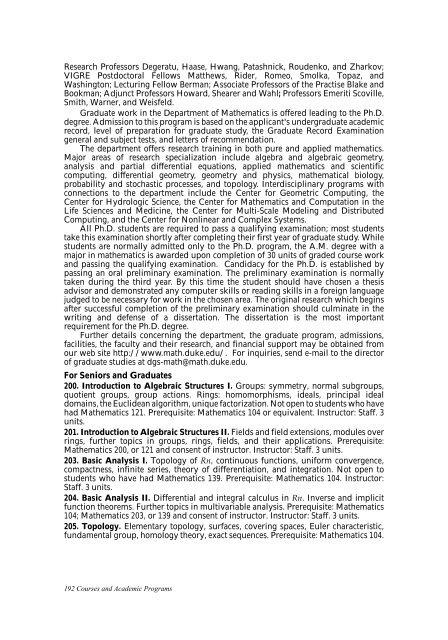Duke University 2003-2004 - Office of the Registrar - Duke University
Duke University 2003-2004 - Office of the Registrar - Duke University
Duke University 2003-2004 - Office of the Registrar - Duke University
You also want an ePaper? Increase the reach of your titles
YUMPU automatically turns print PDFs into web optimized ePapers that Google loves.
Research Pr<strong>of</strong>essors Degeratu, Haase, Hwang, Patashnick, Roudenko, and Zharkov;<br />
VIGRE Postdoctoral Fellows Mat<strong>the</strong>ws, Rider, Romeo, Smolka, Topaz, and<br />
Washington; Lecturing Fellow Berman; Associate Pr<strong>of</strong>essors <strong>of</strong> <strong>the</strong> Practise Blake and<br />
Bookman; Adjunct Pr<strong>of</strong>essors Howard, Shearer and Wahl; Pr<strong>of</strong>essors Emeriti Scoville,<br />
Smith, Warner, and Weisfeld.<br />
Graduate work in <strong>the</strong> Department <strong>of</strong> Ma<strong>the</strong>matics is <strong>of</strong>fered leading to <strong>the</strong> Ph.D.<br />
degree. Admission to this program is based on <strong>the</strong> applicant's undergraduate academic<br />
record, level <strong>of</strong> preparation for graduate study, <strong>the</strong> Graduate Record Examination<br />
general and subject tests, and letters <strong>of</strong> recommendation.<br />
The department <strong>of</strong>fers research training in both pure and applied ma<strong>the</strong>matics.<br />
Major areas <strong>of</strong> research specialization include algebra and algebraic geometry,<br />
analysis and partial differential equations, applied ma<strong>the</strong>matics and scientific<br />
computing, differential geometry, geometry and physics, ma<strong>the</strong>matical biology,<br />
probability and stochastic processes, and topology. Interdisciplinary programs with<br />
connections to <strong>the</strong> department include <strong>the</strong> Center for Geometric Computing, <strong>the</strong><br />
Center for Hydrologic Science, <strong>the</strong> Center for Ma<strong>the</strong>matics and Computation in <strong>the</strong><br />
Life Sciences and Medicine, <strong>the</strong> Center for Multi-Scale Modeling and Distributed<br />
Computing, and <strong>the</strong> Center for Nonlinear and Complex Systems.<br />
All Ph.D. students are required to pass a qualifying examination; most students<br />
take this examination shortly after completing <strong>the</strong>ir first year <strong>of</strong> graduate study. While<br />
students are normally admitted only to <strong>the</strong> Ph.D. program, <strong>the</strong> A.M. degree with a<br />
major in ma<strong>the</strong>matics is awarded upon completion <strong>of</strong> 30 units <strong>of</strong> graded course work<br />
and passing <strong>the</strong> qualifying examination. Candidacy for <strong>the</strong> Ph.D. is established by<br />
passing an oral preliminary examination. The preliminary examination is normally<br />
taken during <strong>the</strong> third year. By this time <strong>the</strong> student should have chosen a <strong>the</strong>sis<br />
advisor and demonstrated any computer skills or reading skills in a foreign language<br />
judged to be necessary for work in <strong>the</strong> chosen area. The original research which begins<br />
after successful completion <strong>of</strong> <strong>the</strong> preliminary examination should culminate in <strong>the</strong><br />
writing and defense <strong>of</strong> a dissertation. The dissertation is <strong>the</strong> most important<br />
requirement for <strong>the</strong> Ph.D. degree.<br />
Fur<strong>the</strong>r details concerning <strong>the</strong> department, <strong>the</strong> graduate program, admissions,<br />
facilities, <strong>the</strong> faculty and <strong>the</strong>ir research, and financial support may be obtained from<br />
our web site http://www.math.duke.edu/. For inquiries, send e-mail to <strong>the</strong> director<br />
<strong>of</strong> graduate studies at dgs-math@math.duke.edu.<br />
For Seniors and Graduates<br />
200. Introduction to Algebraic Structures I. Groups: symmetry, normal subgroups,<br />
quotient groups, group actions. Rings: homomorphisms, ideals, principal ideal<br />
domains, <strong>the</strong> Euclidean algorithm, unique factorization. Not open to students who have<br />
had Ma<strong>the</strong>matics 121. Prerequisite: Ma<strong>the</strong>matics 104 or equivalent. Instructor: Staff. 3<br />
units.<br />
201. Introduction to Algebraic Structures II. Fields and field extensions, modules over<br />
rings, fur<strong>the</strong>r topics in groups, rings, fields, and <strong>the</strong>ir applications. Prerequisite:<br />
Ma<strong>the</strong>matics 200, or 121 and consent <strong>of</strong> instructor. Instructor: Staff. 3 units.<br />
203. Basic Analysis I. Topology <strong>of</strong> Rn, continuous functions, uniform convergence,<br />
compactness, infinite series, <strong>the</strong>ory <strong>of</strong> differentiation, and integration. Not open to<br />
students who have had Ma<strong>the</strong>matics 139. Prerequisite: Ma<strong>the</strong>matics 104. Instructor:<br />
Staff. 3 units.<br />
204. Basic Analysis II. Differential and integral calculus in Rn. Inverse and implicit<br />
function <strong>the</strong>orems. Fur<strong>the</strong>r topics in multivariable analysis. Prerequisite: Ma<strong>the</strong>matics<br />
104; Ma<strong>the</strong>matics 203, or 139 and consent <strong>of</strong> instructor. Instructor: Staff. 3 units.<br />
205. Topology. Elementary topology, surfaces, covering spaces, Euler characteristic,<br />
fundamental group, homology <strong>the</strong>ory, exact sequences. Prerequisite: Ma<strong>the</strong>matics 104.<br />
192 Courses and Academic Programs









